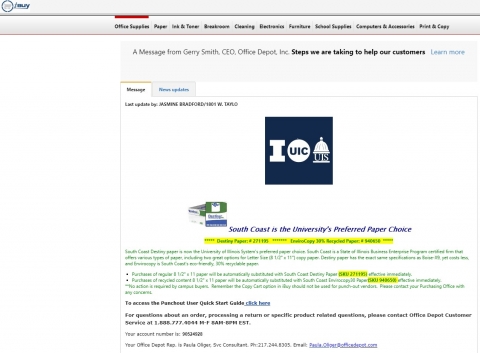You are here
Recycled-Content Paper Policy in CAM (In Progress)
Recent Project Updates
-
7/30/2025One focus area in FY26 will be to narrow, update, and execute a new CAM policy as an update to BF-11, "Recycling, Recycled Products Procurement, and Waste Reduction". The goal of the updated CAM policy will be to ensure that all paper purchased on...
-
4/1/2025Attached is paper data from iBuy spanning FY15-24.
Project Family
Percent of Paper Purchased from OfficeMax with Recycled-Content
Related Files
 FY17 CAM policy for recycling and waste reduction
FY17 CAM policy for recycling and waste reduction Draft Recycled Content Paper Policy 2016.docx
Draft Recycled Content Paper Policy 2016.docx UIC draft policy SUS-4300-001 _sustainable_paper_use_1.31.2017.docx
UIC draft policy SUS-4300-001 _sustainable_paper_use_1.31.2017.docx Great New Pricing on Recycled Paper.docx
Great New Pricing on Recycled Paper.docx Flier for recycled-content paper.pdf
Flier for recycled-content paper.pdf Illinois Student Government Resolution Feb 2018 for Recycled-Content Paper.pdf
Illinois Student Government Resolution Feb 2018 for Recycled-Content Paper.pdf
Project Team
-
Primary Contact:
Daphne HulseProject Leader:
Daphne HulseTeam Members:
- Ben McCall
- Cindy Klein-Banai
- Dave Grogan
- Dan Sjazna
Dates
-
Proposed May 4, 2016Proposed by Ben McCallInvestigated July 18, 2017Investigated by Morgan Johnston
Themes
-
Primary Theme:

